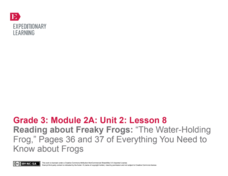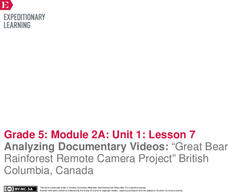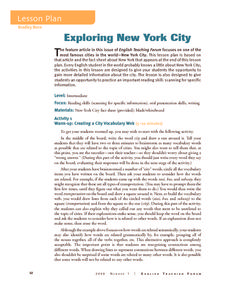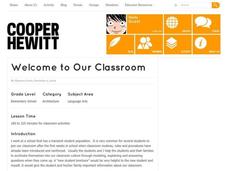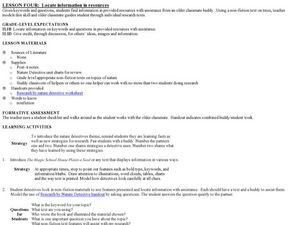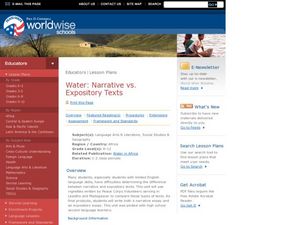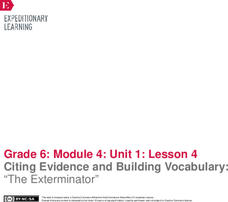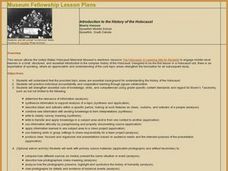EngageNY
Analyzing the Features of a Newspaper Article
There's more to newspaper articles than meets the eye. Scholars learn the different features of a newspaper article, including headline, byline, subheadings, etc. Pupils circle the features in an article as the teacher discusses their...
EngageNY
Writing to Inform: Analyzing a Model Using a Rubric
Learn to write right. Scholars analyze the model essay Adversity Faced by Townspeople in the Middle Ages. They discuss the essay and make annotations working with an elbow partner. Learners then take another look at the essay using a...
EngageNY
Reading about Freaky Frogs: “The Water-Holding Frog"
Boost reading comprehension skills with a lesson all about freaky frogs. A poem hooks scholars and takes them into a reading of an informational text followed by peer discussions. A three-page worksheet focuses on text features and...
EngageNY
Reading about Freaky Frogs: “The Amazon Horned Frog"
The Amazon Horned Frog is the focus of a activity designed to encourage readers to ask and answer questions. A frog-themed poem opens the door to a whole-group discussion. Following a read-aloud of an informational text, a three-page...
Peace Corps
Family
Family traditions are the focus of a lesson that explores the lives of children in India and those in your classroom. Scholars examine their own family roles and traditions, then respond to an informative text detailing a young girl's...
EngageNY
Analyzing Documentary Videos: “Great Bear Rainforest Remote Camera Project” British Columbia, Canada
Lights, camera, action! Viewers discuss a video about the Great Bear Rainforest Remote Camera Project. As they watch, they find the gist, determine the meaning of unknown words, and analyze the features of a documentary as an...
National Council of Teachers of English
Writing Acrostic Poems with Thematically Related Texts in the Content Areas
Scholars scour thematically aligned texts to gather a bank of words they can use in an original acrostic poem.
Curated OER
Discovering Saturn, The Real "Lord of the Rings"
Reading, writing, and rings! A lesson from NASA combines space science with authentic reading and writing tasks. Included in this lesson are pre-reading activities, four mini informational booklets on Saturn, a structured note-taking...
Global Publishing Solutions
Exploring New York City
Your class members will get up close and personal with the Big Apple in this fantastic lesson plan, which introduces learners to not only the concept of a city, but also provides a thorough overview of New York City itself and its unique...
Curated OER
Who Would Win? Killer Whale vs. Great White Shark Storia Teaching Guide
Teacher guides are wonderful tools with tons of ideas that help you relate content in many different ways. Using the high-interest book, Who Would Win? Killer Whale vs. Great White Shark, learners hone their discussion and reading...
Curated OER
Organizing Information into an Outline
Learners explore outlines. In this nonfiction comprehension and study skills lesson plan, students complete a traditional outline for the book Animal Homes by Ann O. Squire following guided instruction as the teacher models gathering...
Curated OER
Welcome to Our Classroom
Students create a brochure for new students. In this writing process lesson, students brainstorm, create and edit ideas for making a brochure for new students. Students use a word processor to make the brochure and edit, copy, move, and...
EngageNY
Determining Author’s Opinions, Reasons, and Evidence: Signs of Hope and Progress for African Americans in the 1920s (Promises to Keep, Pages 14–15)
Caption this. Readers look at the text features in Promises to Keep and pay special attention to the photographs and captions before adding to the Features of Informational Text anchor chart. Learners then answer questions about life in...
Curated OER
Read All About it
Learners create and publish a newspaper that reflects and explains pioneer and medieval societies. They become newspaper writers for a specific time period. They adopt a holistic approach to exploring community life in medieval and...
Curated OER
Synonyms and Antonyms
Mix up your writing lessons by having kids look at recent newspaper articles instead of their own work. They work in pairs and rewrite sports news articles using synonyms and antonyms for a set number of words. Then they share their work...
Curated OER
Locate Information in Resources
Students listen to the Magic School House Plants a Seed. In this locating information lesson, students discuss the various presentations of information in the book. Students complete a worksheet of information.
EngageNY
Preparing to Write Historical Fiction: Determining Characteristics of the Genre
A language arts instructional activity helps young writers identify elements that make up historical fiction. First, it guides them through elements of fictional pieces with vocabulary cards. Then, pupils work collaboratively to...
Curated OER
Monster Plants Storia Teaching Guide
Who wouldn't want to read a book about monster plants? Get those kids into informational texts with an engaging topic, like meat eating plants! You'll use the teaching guide to provide structured practice as your class reads to...
Curated OER
Synthesis of Information
Locating and synthesizing information is an essential part of the research process but can be overwhelming for many young writers. Eliminate some of the stress and confusion, this resource suggests, by separating these steps. To focus...
Curated OER
Water: Narrative vs. Expository Texts
A reading of vignettes written by Peace Corps Volunteers serving in Lesotho and Madagascar launches a study of the difference between narrative and expository texts. As final products, young writers craft both a narrative and an...
Bantam Books
The Tempest: Think-Aloud Annotation
It can be difficult to refer back to a text when analyzing it, so annotation is a great tool for kids to track what they are reading. A thorough and well-organized lesson guides learners through the process of annotating William...
EngageNY
Citing Evidence and Building Vocabulary: “The Exterminator”
It is an out-of-body experience. Scholars take a look at the sidebars outside the body of the text in The Exterminator. They discuss the purpose of this type of text feature and work to determine the gist. Learners write unfamiliar...
Curated OER
The Learning Network: Poetry Pairing July, 21, 2011
Although not a complete lesson plan, this set of emotionally powerful texts could be used in a variety of lessons. From The New York Times' Learning Network site, the resource includes a poem, an excerpt from a New York Times article and...
Curated OER
Introduction to the History of the Holocaust
The Holocaust is unbelievable! Examine this piece of history with your class. Using the Internet, research groups determine the relevance of information presented, compare how different sites present the same information, synthesize...




